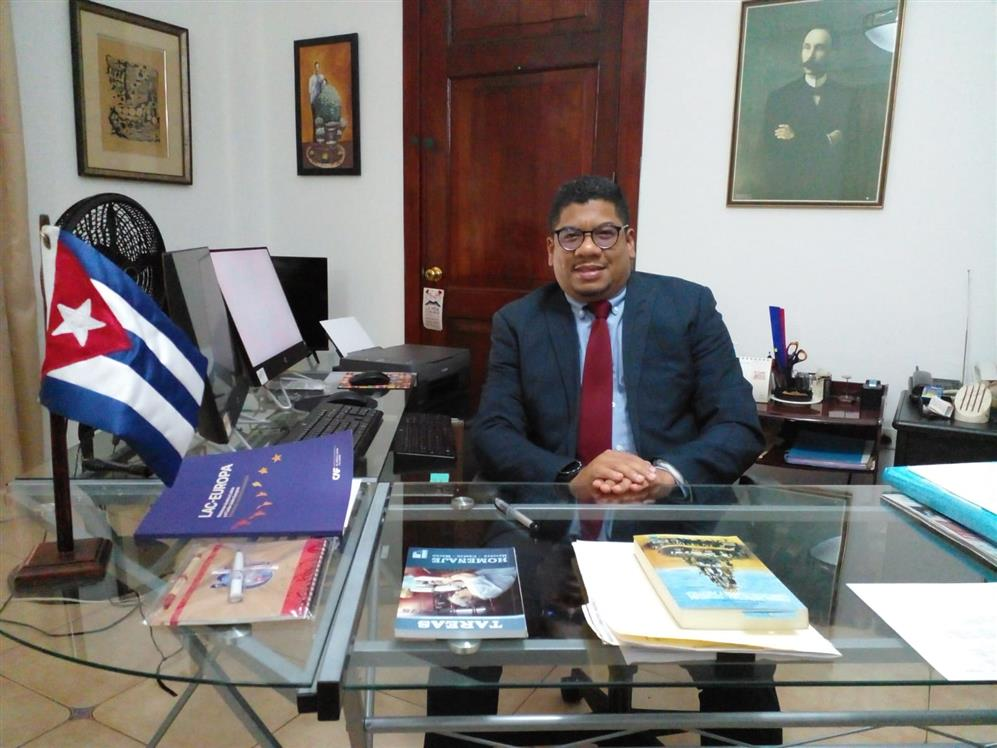
Panama City, October 19.- The Cuban ambassador in Panama, Víctor Cairo, asserted that with creative resistance his people will know how to defeat the blockade imposed by the United States more than six decades ago.
The diplomat reflected on the impact of the economic, commercial and financial blockade with which Washington tries to suffocate the island, despite the fact that each year the hostile policy has greater rejection from the international community within the United Nations (UN).
A few days before the UN General Assembly considers the Draft Resolution on the need to end the United States blockade against Cuba, on November 1 and 2, Cairo indicated that the moral damage of the siege is invaluable.
How is it possible to calculate the psychological damage caused by the blockade when a mother whose child with cancer cannot receive the necessary medications because the United States refuses to grant a license for their purchase; or when medical care depends on equipment that has more than 10 percent of its components manufactured in the northern country?, he asked.
Furthermore, he added, this painful impact on all Cuban families and the more than 60 years of that economic war would have to be multiplied.
For Cairo, the blockade is the main obstacle to the development and well-being of Cuba, and actions in the health sphere are increasingly cruel and inhumane, due to Washington preventing access to important medicines and prohibiting scientific exchange and academic, particularly the treatment of oncological diseases.
In Panama we have taken steps to access reagents for testing patients in Cuba, which has not been possible for our country to acquire due to coercive and intimidating measures of the blockade that instill fear and threaten those who try to carry out exchanges with us, he said.
In April of last year, he added, the Treasury Department fined North American multinational mining multinationals such as Newmont Corporation and Chisu Corporation International with thousands of dollars for violating regulations of the blockade of Cuba, upon learning that subsidiaries in Suriname and Panama had acquired explosives from Cuban origin for use in extractive activities.
The regional office of the United Nations Development Program (UNDP) has also denounced the closure of bank accounts, especially in Mexico and Panama, to entities associated with the multilateral organization for promoting projects with Havana, he indicated.
The ambassador explained that the Martí’s Association of Cuban Residents in Panama, in a letter to the representative of the United States, Mari Carmen Aponte, has also denounced, among other scenarios, the obstacles to sending remittances to their families.
Faced with the current situation, Cairo praised the historical position of the Government of Panama in rejection of the United States blockade, which has been reflected in its responses to the report required by the UN on the 30 occasions since 1992 that the General Assembly approves a Resolution that demands the end of the siege.
He also highlighted that another step and example of this position was taken by Foreign Minister Janaina Tewaney, when speaking at the G77 and China Summit, held on the island on September 15 and 16.
Civil society organizations, particularly unions and solidarity groups, have also been consistent in supporting the fight to eliminate the blockade, he noted.
Currently, he said, they are promoting a campaign to add signatures that support the global demand that Cuba be removed from a spurious list of nations that sponsor terrorism, which has increased in the financial sphere the more than 240 measures that the Joe Biden administration maintained since his predecessor Donald Trump (2017-2021)
At the end of this month of October, he announced, the National Coordinator of Solidarity with Cuba will hold the XXIV Annual Meeting in Boquete, western province of Chiriquí, an event that will also reaffirm with its respective resolutions the will to consolidate the condemnation of the blockade and the demand that this tool of economic war be put to an end.
Cairo said he is convinced that in the current conditions, as the president of Cuba, Miguel Díaz-Canel, said, the people of the largest of the Antilles with creative resistance will overcome the blockade and to do so it has the support of the international community and the various solidarity movements throughout the planet and also in Panama.
In the communication sphere there will also be this battle against those who think that the blockade is something of the past, because as has been shown it is more current and harmful than ever, he stressed. (Text and photo: PL)